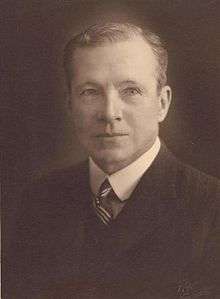Donald Charles Cameron (politician)
Sir Donald Charles Cameron, KCMG, DSO, VD (19 November 1879 – 19 November 1960) was an Australian politician and soldier. He was a member of the Australian House of Representatives as the Nationalist Party of Australia member for Brisbane from 1919 to 1931 and as the United Australia Party member for Lilley from 1934 to 1937.
Sir Donald Cameron KCMG, DSO, VD | |
|---|---|
 | |
| Member of the Australian Parliament for Brisbane | |
| In office 13 December 1919 – 19 December 1931 | |
| Preceded by | William Finlayson |
| Succeeded by | George Lawson |
| Member of the Australian Parliament for Lilley | |
| In office 15 September 1934 – 21 September 1937 | |
| Preceded by | George Mackay |
| Succeeded by | William Jolly |
| Personal details | |
| Born | 19 November 1879 Brisbane, Queensland |
| Died | 19 November 1960 (aged 81) Brisbane, Queensland |
| Nationality | Australian |
| Political party | Nationalist (1919–31) UAP (1931–37) |
| Occupation | Military officer |
| Military service | |
| Allegiance | Australia |
| Branch/service | Australian Army |
| Years of service | 1901–1919 |
| Rank | Lieutenant Colonel |
| Commands | 5th Light Horse Regiment |
| Battles/wars | Boxer Rebellion Second Boer War First World War
|
| Awards | Knight Commander of the Order of St Michael and St George Distinguished Service Order Colonial Auxiliary Forces Officers' Decoration Mentioned in Despatches (4) Order of the Nile (Egypt) |
Early life and military career
Born in Brisbane, the son of a grazier, he was educated at Toowoomba Grammar School and Brisbane Grammar School. He served with the Queensland Imperial Bushmen in the Second Boer War and with American forces in China during the Boxer Rebellion. He managed the family property, Kensington Downs, along with his brothers between 1902 and 1914, when he enlisted in World War I. He was shot through the liver and lung at the Battle of Gallipoli, and finished the First World War as a lieutenant colonel in command of the 5th Light Horse Regiment. He was mentioned in despatches, received the Order of the Nile, and was appointed a Companion of the Order of St Michael and St George for his war service.[1][2]
Politics
In 1919 he won the seat of Brisbane for the Nationalist Party of Australia, holding it until he was defeated by the Australian Labor Party in 1931. In 1934 he won the nearby seat of Lilley, but retired in 1937. In 1932 he was made a Knight Commander of the Order of St Michael and St George.[2][3]
Later life
During World War II, Cameron was chairman of the New South Wales recruiting committee for the Royal Australian Air Force. He died on 19 November 1960 and was cremated; his ashes were buried in the family cemetery on Home Creek Station.[2]
References
- "COLONEL CAMERON Retiring". The Evening News (2458). Queensland. 25 July 1929. p. 11. Retrieved 6 January 2017 – via National Library of Australia.
- Cameron, Sir Donald Charles (1879–1960). Australian Dictionary of Biography. National Centre of Biography. Retrieved 6 January 2017.
- "U.A.P. CANDIDATES WIN BARTON AND EAST SYDNEY". Barrier Miner. XLIV (13, 280). New South Wales, Australia. 28 December 1931. p. 1. Retrieved 6 January 2017 – via National Library of Australia.
| Parliament of Australia | ||
|---|---|---|
| Preceded by William Finlayson |
Member for Brisbane 1919–1931 |
Succeeded by George Lawson |
| Preceded by George Mackay |
Member for Lilley 1934–1937 |
Succeeded by William Jolly |